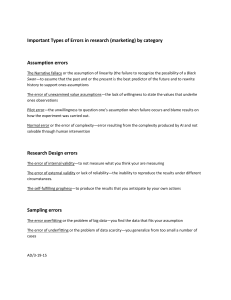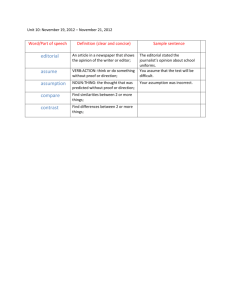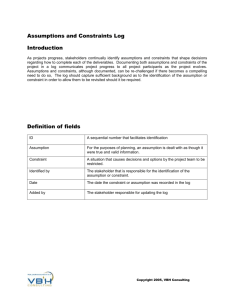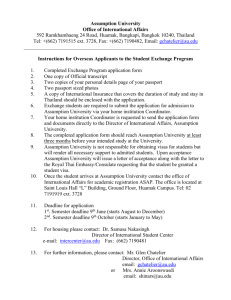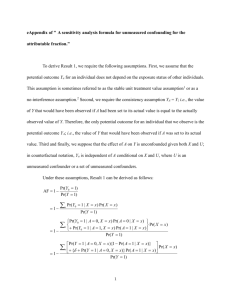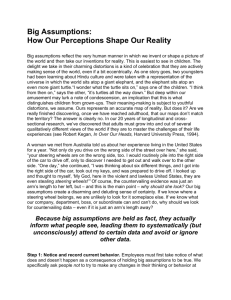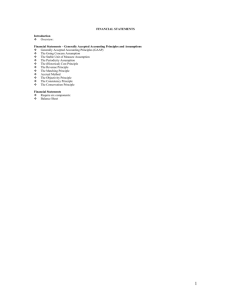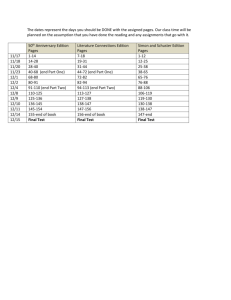Assumption University`s experience in international
advertisement
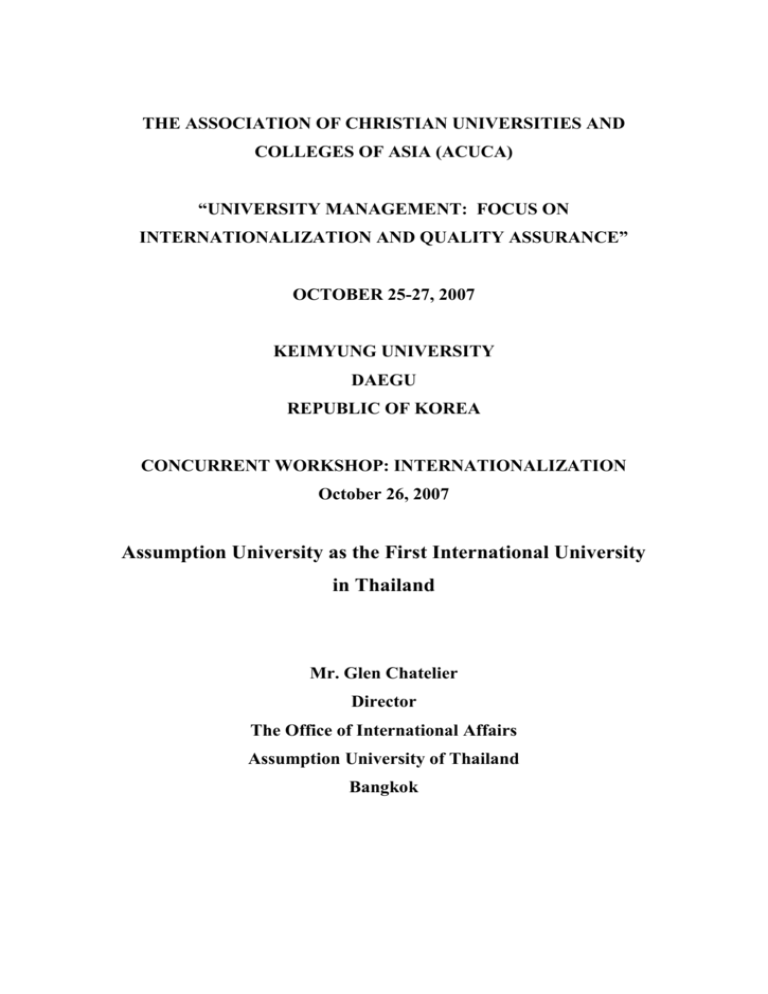
THE ASSOCIATION OF CHRISTIAN UNIVERSITIES AND COLLEGES OF ASIA (ACUCA) “UNIVERSITY MANAGEMENT: FOCUS ON INTERNATIONALIZATION AND QUALITY ASSURANCE” OCTOBER 25-27, 2007 KEIMYUNG UNIVERSITY DAEGU REPUBLIC OF KOREA CONCURRENT WORKSHOP: INTERNATIONALIZATION October 26, 2007 Assumption University as the First International University in Thailand Mr. Glen Chatelier Director The Office of International Affairs Assumption University of Thailand Bangkok Assumption University’s experience in international education began the year it was set up, in 1969. Originating as an incubator program in the Assumption School of Business (ASB), the academic focus was on business studies, using English as the only means of instruction and communication. Among the first enrollments, a class of 61 students, Mr. Ting Failan from Hong Kong who majored in General Management, was the first international student. Initially located in Assumption Commercial College, a premier institution for commercial sciences, run by the Montfortion Brothers of St. Gabriel in Thailand, by 1972, several developments occurred with ASB. 1. The Curriculum was deemed acceptable by students, lecturers, the University council, and ASB continued to offer its English based curriculum and education. 2. The name ASB was changed to Assumption Business Administration College (ABAC) in 1972 and the status of a degree-granting private college was accorded to ABAC by the Royal Thai Ministry of Education in 1975. 3. The Brothers of St. Gabriel acquired a piece of land, east Bangkok, to continue running the degree program, in a location known as Hua Mak and which today constitutes the down-town campus, one of the three campuses from which we operate. The main campus is at Suvarnabhumi, 12 kilometers away from the New Bangkok International Airport, and the third campus is at Zen World Tower in the business district of Bangkok. As of 2007 Assumption University (upgraded from a college in 1990) has the following international performance factors: I.1. Curricula of international standards delivered in English across following levels of degree programs 40 Undergraduate degrees 1 Postgraduate diploma program in Education 44 Master degree programs 13 Doctoral degree programs I.2. Special features of the undergraduate degree programs: i. Across all disciplines students must take the following basic and core required courses (among others) English Courses Business Courses Computer Courses ii. All Undergraduate Students are required to pass a Final English Oral Test (FEOT) administered by the IELE. iii. All students are required to attend 16 professional and business ethics seminars, which are non-credit, but are absolutely required for graduation. iv. Over the past 16 years, Au has collaborated with: a. Loyola College, Maryland in a study abroad semester for American Undergraduate students at Assumption University. All credits are transferred back to the Loyola College degree program. b. Since 1997 Loyola College, Maryland has supported Au by recruiting American teachers for the undergraduate core English courses. v. Since 1991 Assumption University has offered a twinning degree program in the Bachelor of Business Administration with Wollongong University, Australia. vi. Since 1994 Assumption University has exchange student programs with international universities around the world, leveraging on partnerships through international consortia on education, international associations, ministerial and national schemes and through cultural bridging. vii. Since 1974 Assumption University has had adjunct professors from local industry, government agencies, diplomatic corps, international/multinational/global businesses and visiting professors from USA, Canada, Europe, Latin America, Northern Africa, the Middles East, Asia, Japan and Australia. I.3. Special features of the graduate programs (master degree level) i. All graduate students are exposed to advanced practices in business, technology and the professions through internships, travel abroad, and guest lectures from experts in various fields. ii. Currently the Graduate Schools of Business, Computer Sciences, Telecommunication Sciences, Education, English Language studies and Biotechnology have international collaborations ranging from joint degrees to joint researches iii. The Graduate School of Computer Sciences requires all master degree students to become members of professional associations and to publish in international journals. iv. The majority of master degree level courses require students to do master thesis or substantial projects v. The Graduate School of Business organizes “Speaker of the Month” seminars at which established experts in Business and International trade speak. I.4. Special features of Ph. D programs i. All Ph. D candidates publish in international journals prior to their thesis defense and just after their thesis proposals. ii. Study visits abroad or International conference presentations are required of all doctoral candidates. iii. Second language specialization is also required by some degree programs. II . International Faculty and Students As of the present time, Assumption University has the following profiles of international faculty and students. II.1 Full time Faculty - 1115 International Faculty (from 39 countries) - 351 Thai Faculty members - 762 Faculty with full professorships: 7 Faculty with Assoc. professorships: 20 Faculty with Assistant professorships: 51 Ph. d – 379 Master – 602 Bachelor -132 (Source: Au Office of Human Resources Management, 2007) II.2 Students Total number of students: 20,000 International (from 75 nations): 2,333 (Source: Au Office of the Registrar, 2007) II. 3. Active student exchange programs currently exist in: USA Australia Finland Netherlands Sweden Poland France Germany South Korea Japan China (Hong Kong – Territory) Taiwan II.4 Au has active study abroad programs with USA Australia Japan Vietnam Cambodia (Source: Au Office of International Affairs, 2007) III Au has memberships in the following: International Association of University Presidents International Association of University Presidents – Asia Pacific University Mobility in the Asia Pacific (UMAP) Association of Presidents of Thai Higher Education Institutions of Thailand IEEE IIBD IFCU ACCUCA ASEACU PAPE ASAHEIL FIILM UPAL IV Au is recognized and accredited by: The Royal Thai Civil Service Commission The Association of Indian Universities (AIU) The Ministry of Education, China The American War Veterans Association Au is listed in the handbook of International Universities (Paris) V As of the year 2007, Au has awarded Honorary degrees to International Personalities: Royalty : 2 Diplomats : 2 Catholic Clergy: 1 Academics 2 : VI The University has hosted (and will host) the following; between 1992 and 2007 International Business Conference of the IEEE (2) ACUCA General Assemblies (2) IFCU General Assemblies and Meetings (2) International Conference on Education (3) PAPE General Assembly ASEACCU General Assembly AYF (4) 2004 International Conference on Information and Communication Technologies World University Debating (Asian) World University Debating (Assumption Worlds) Dec 27,2007 – Jan 5, 2008 24th Universiade 2007 (August 8 – 18, 2007) FABC meetings 1997 – Present (Source: Au Office of The President, 2007) VII. Au International journals ABAC journal ABAC Today newsletter Au Technotes IEEE Journal The English Teacher The Au Journal of Management The Journal of Religion and Philosophy Au Press (Student Publication) (Source: Au Press, 2007) VIII. Responsible Units for International Initiatives 1. The Office of International Affairs (OIA) 2. The International Students Center IX International Campuses: All three campuses of the University are of international standards. The main campus at Suvarnabhumi (12 Kilometers away from the New Airport) has state-ofthe-art classroom facilities and sports and recreational centers for the students. All three campuses have internet links. All lecturers and students have internet accounts and teaching and learning is carried on, in part, via the internet. The University is the third global Sun MICRO SYSTEMS site and Au is the founding member of an internet society for education in 1993. Au is the sole representative in Asia for Cisco Systems. X. International Cooperation in Teaching and Research Assumption University has identified two strategies for itself, in the global marketplace of education: 1. teaching and learning 2. service to society In regard to both these strategies, the university has constantly emphasized the relevance of upgrading teaching and learning systems. More recent innovations in teaching and learning include: 1. Distance education courses at master and Ph. D levels 2. The developments of a KMS – Knowledge Management System The bedrock of such systems is a unique caring among the teachers for students and the constant monitoring of classroom pedagogy. Assumption University’s service to society takes the following forms: 1. Service learning for the undergraduate students. Projects include teaching English and basic trades to prisoners – both Thai and International 2. Exposure to H.M The King’s sufficiency economy and working with farmers on community projects 3. Some of the graduate schools organize social service and charity projects for the students 4. Assumption University lecturers serve as consultants to various of the Royal Thai Ministries and private companies. Some lecturers lead workshops on various topics, nationally and internationally. 5. Assumption University’s ABAC Poll is a public perception survey research on socio-political and economic issues. It has acquired a strong reputation in Thailand. 6. The Graduate School of Business has initiated an Innovation, Creativity and Enterprise center (ICE) for students to be able to evolve small and medium sized businesses, incubate them at the university, and then take them out into national and international markets. An allied project has been the SIMBA – Small and Medium Enterprise research and consultation, in collaboration with the Royal Thai Ministry of Commerce’s SME bureau. 7. The Graduate School of Business has partnered with institutions in China, Cambodia and Vietnam to offer joint degree programs and training for lecturers in the programs. In this we see the trend of Assumption University exporting our educational services to neighboring countries. Off-shore campuses are being planned in the Middle East, South Asia and South East Asia. XI The Challenges Ahead for Au 1. Quality Assurance: Since 2000 we have set up our AuQS – Center for Excellence. Almost all administrative and academic units have compiled with the AuQS. Au has also conformed to the Thai ONESQA audits. The difficulty lies in being misperceived as a weak research University. Our response to the challenge of Quality Assurance and benchmarking is to entrench our academic services and administration in a “Malcolm Baldrige” type of quality assurance system. This is being evolved gradually. 2. The negative impact of globalization as instability in currency markets, exchange rates, shifts in global migration patterns, social instability influenced by terrorism, aids, poverty, job losses and global warming. Assumption University is a proactive institution with visionary management and capable leadership. Our response to global challenges lies in enhanced financial planning and forecasting, in open and flexible working systems and in learning from ourselves and others, constantly. XII Suggestions: The Au International Education Model (Chatelier, Glen: 2007 The Prism of Academic Excellence) As a prototype for other ACUCA Members Influencers (Aspirational Factors) International Collaborations And Networking. Contextual Environments Growth Indicators (Impact factors) (Competitive Factors) Ministry of Education Regulations (Thai) Culture Mobility of Teachers & Learners Global – Regional local developments Institutional Reality (Au) Core Competencies in International Education Outcomes (Unique Institutional Identity) Best in Private International Education International Recognition Value Growth HR Training Innovation Knowledge Generation Service Assurance Management capability Financial Planning Career – Focused Training International Faculty & Students Strong Curriculum Infrastructure
